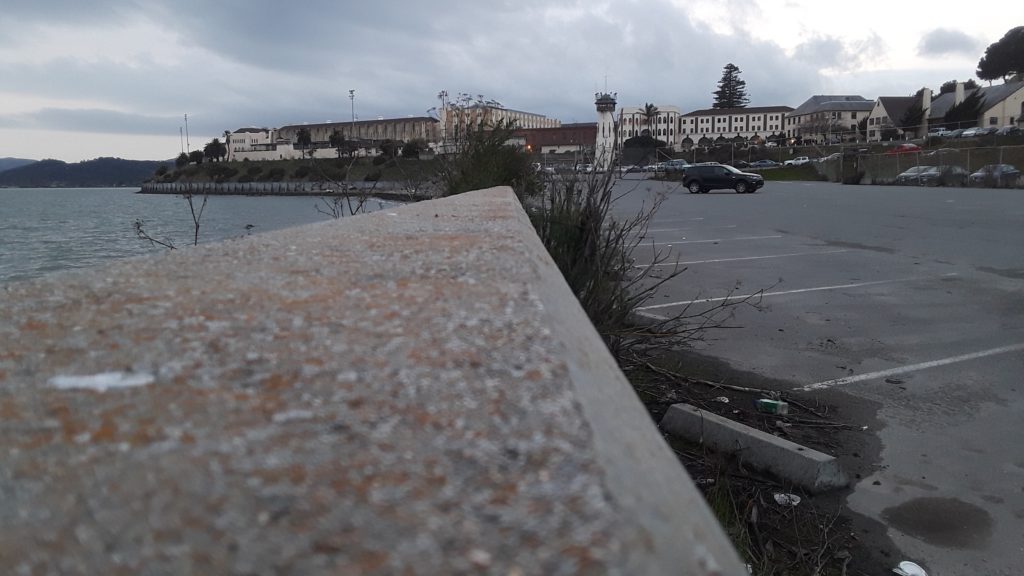Eric Genuis has an amazing apostolate: bringing beauty to prisoners.
A self-taught composer, he brings first-class musicians-lush violins and voices-to a darkened, harsh, inmate world. “There isn’t much beauty in prison,” he told me.
I met him in Larkspur, California, not long after he returned from playing San Quentin. “It’s always tough, and I had to walk a long distance, carrying my piano keyboard from the visitor’s parking lot. It struck me on the way: What a beautiful view.”
It struck me, too, as I turned into the visitor’s parking lot. I took the above feature photo of San Quentin from that lot, which is at the intersection of profound natural beauty, history, sin, and the imprisoned soul.
“It’s so old and historic, you feel a bit overwhelmed. I’ve never seen a prison like that, which has a beautiful old courtyard,” Genuis mused.
Most prisoners who attend his concerts have never heard a violin. “I am not musically inclined in many other genres besides hip-hop,” testified an inmate from one of Genuis’ previous concerts, “but listening to them play the classical music with the instruments opened my eyes.” (Genuis would call his music a fusion of classical and modern styles).
Most prisoners who come don’t know what to expect. They are usually not pleased to be ordered to attend. Captive audience, indeed. Eric showed me more of the essays prisoners in a previous concert had written about the experience.
A lot of them begin like this: “When I heard that we were forced to go see a concert I was somewhat upset. I thought it was going to be the jail’s church choir. When I got there and the guy started to speak that’s when he grabbed my attention.”
Through romantic music and raw emotion, Eric Genuis touches hearts. His great subject is the beauty that can arise, through grace, from suffering.
Genuis touches hearts, but more importantly, souls: “It felt like the music was communicating with my soul. The musical notes that were in the air were stairs to my heaven. At this point I was no longer upset and glad that I had gone,” the formerly resentful inmate finished.
Back at San Quentin, Eric moved into the chapel. “Stark, barn-like,” he reported. Fifteen minutes later, the inmates started coming in.
“One of the thing that doesn’t get old is they are in their prison uniform. It’s blue and one the side it says CDR prisoner on their baggy pants. Their tops are also light blue. The pants are darker blue.”
Sixty men of various ages sit before Eric Genuis and his chamber quartet. He saw a lot of old men that have been there since they were young. Some men were meticulously kempt, and some demonstratively unkempt—mixed signs of hope, despair, and mental illness.
Eric Genuis wanted to touch all of these men. He began by cracking a joke. Then he talked about music and what it means to him. Especially, he told me and them, “in the places of suffering, like when my own baby died.” Eric Genuis and his wife have known raw, naked pain. “My wife and I have lost 7 children,” he told me, “5 miscarriages and two infant deaths.” Of their four living children, one deals with Asperger’s and another has Down’s Syndrome.
He knows, from personal experience, the pathway through pain to transcendence, via Grace. The men can hear it, in his voice and his music, the intensity of the personal experience of God that informs his words and his work and his life.
Eric seeks not praise from the high, but the light in the eyes of men who are broken. “My favorite compliment is, ‘I don’t know nothing about music but I was so moved by your music.’ I’m a daily communicant. I love my faith, I want God to be part of every step I take.” He paused to put his mission into words: “I can write music that moves people. I try to play it for people who are forgotten. My Carnegie Halls are the prisons and the rehab centers, or at a treatment center for sexual abusers. My ambition is to play for people, to play for people that are bleeding.”
How do you get these prison gigs, I ask? It turns out that Eric is not only a self-taught composer, he’s a self-taught entrepreneurial evangelist as well, breaking new ground. Eric just wrote to Catholic prison chaplains, offering free concerts. Only a few people took him up on the offer. But after he performed, Eric got those delighted prison chaplains to write to the other prison chaplains, and more invitations followed.
The San Quentin performance in January is part of an 8-prison tour, interspersed with concerts at Catholic parishes and schools. He and his family survive on the charity of donors, and the love offerings he gets from playing in Catholic parishes and schools as well.
Some of his biggest fans are the Catholic Hollywood elite. His website, EricGenuis.com, contains praise from Jim Caviezel and Stephen McEveety. Actor Kevin James (who invited him to play an act in Mall Cop 2) raved, “Our family has been graced with experiencing first-hand the recordings and concerts of the incredibly gifted Eric Genuis. Words cannot convey the truly captivating, mesmerizing power his compositions have to embrace the soul.”
All that praise means something to Eric, naturally, but not as much as the reactions he gets from inside prison.
“A Satanist guy at one concert told me he has never cried in his life,” Eric recalled for me, “but he cried in my arms. This boy had Hellfire tattoos up his arms. I prayed silently, ‘The boy is deeply, deeply wounded. Lord, don’t let this boy go, touch him in his suffering.’ Maybe this is a glimpse of the way Jesus looks at suffering: as the invitation to go deeper in our love.”
We are back at the great theme again, the forgotten theme of contemporary American Catholic life: that suffering can have meaning.
“I think suffering is the greatest teacher out there. Suffering is the only thing that can lead us to detachment from the things of the world, sometimes, that can pull our souls towards God,” he said. “I look at all those men in there and the wounds are profound and there is no hiding it: ‘No river of tears can undo what I have done’, one man told me.”
After the show in San Quentin ended the men came up and were hugging and crying. His story reminded me of the famous opera scene from Shawshank Redemption. So, I ask him if that was part of his inspiration.
“Yes,” Eric admitted, “the first prison concert I did, in the middle of the first song, a man stood up and said, ‘I forgot what hope felt like.’ I remembered that scene from the film and thought, I am living that scene.”
To donate to Eric Genuis prison ministry, “Concerts for Hope,” or to schedule a concert go to https://www.ericgenuis.com




